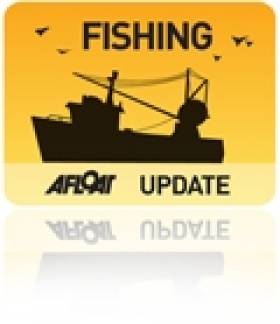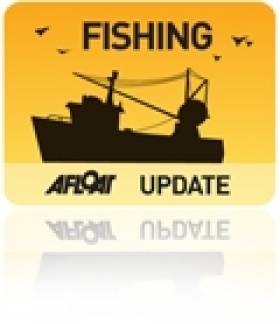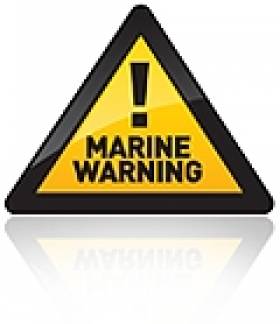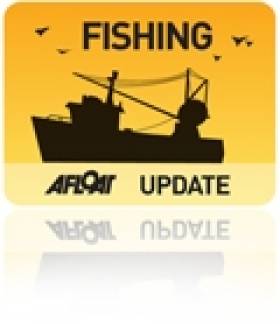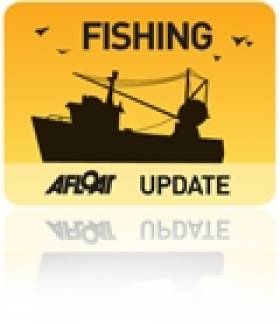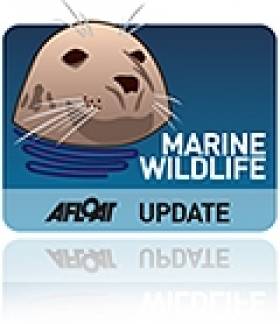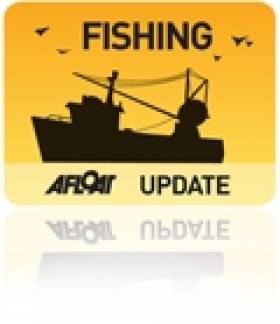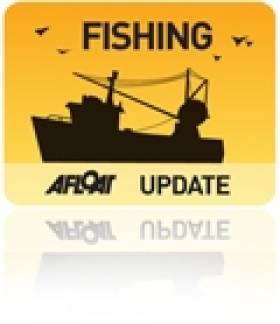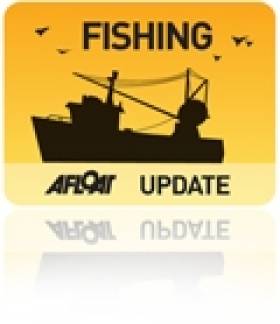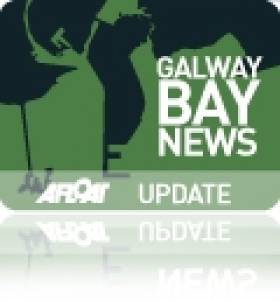Displaying items by tag: Fishing
Unfishable Areas May Be Refuge for Endangered Flapper Skate
#FISHING - Marine scientists working in the Celtic Sea have discovered a natural refuge for the critically endangered flapper skate.
Many elasmobranchs (sharks, rays and skates) are highly vulnerable to over-fishing, but a new paper in the open access journal PLOS ONE shows that small areas of the seabed that experience below-average fishing intensity can sustain greater populations of these species.
The study reveals that one remarkable area in the northeastern Celtic Sea - where uneven seabed makes trawling difficult - supports at least ten species of elasmobranch, including the rare blue skate (Dipturus flossada) and related flapper skate (Dipturus intermedia).
Dipturus was previously considered to represent a single species (D. batis), but made the news in 2009 when a case of misidentification was revealed.
Both species are now listed as critically endangered but populations of the flapper skate, which can grow up to 2.5 metres in length, are considered to be under greatest threat from extinction.
European Union regulations mandate that fishermen throw back any flapper skate but its slow growth and reproduction mean that even very low levels of fishing mortality are now unsustainable for this species.
Scientists from Queen’s University Belfast, Bangor University and the Marine Institute carried out the study. Lead researcher Dr Samuel Shephard suggests that “the discovery of a Celtic Sea stronghold for flapper skate provides a remarkable opportunity to help save a species on the verge of extinction”.
Professor Michel Kaiser, chair in marine conservation at Bangor University, added: “Some have previously argued that areas of little interest to the fishing industry are not worthy of conservation, however this study clearly overturns that perception and highlights just how important some of these areas are."
Importantly, the fishing industry has reacted positively to the ‘win-win’ situation that an area of little commercial interest has potential as an important marine reserve.
Professor Dave Reid of the Marine Institute presented the information to industry leaders, and this has led to the inclusion of the area in proposed management plans for elasmobranchs in the Irish and Celtic Seas.
Eibhlín O’Sullivan, CEO of the Irish South & West Fishermen’s Organisation, responded that the Irish fishing industry "has been working with the Marine Institute for the past 18 months on developing a management plan for skates and rays. This new research adds valuable information for the identification of potential seasonally closed areas."
Prof Reid noted that “this is a great model for collaboration on conservation between the fishing industry and scientists”.
The research leading to these results has received funding from the European Community's Seventh Framework Programme (FP7/2007-2013).
MEP Raises Fresh Concerns Over Fishing Practices off the South-West Coast
#fishing – Sean Kelly MEP (Ireland South) has raised 'serious concerns' about the fishing practices of a number of vessels understood to be under the control of Dutch companies off the South West coast of Ireland.
"Serious concerns have been brought to my attention regarding the practices of some Dutch-owned fishing vessels of the South West coast. There are allegations of dumping at sea by these vessels which are only declaring what they land at port and not what is actually caught, which is illegal," Sean Kelly MEP said in Brussels today.
Mr Kelly understands that around 25-40 Dutch factory ships operate off Ireland and are owned or controlled by Dutch companies but not necessarily registered under the Dutch flag.
"I will be looking into these concerns immediately with a view to raising the issue at an EU level. If these concerns are proven correct, then quick, firm action must be taken. We have to protect our valuable marine resources and protect the livelihood of Irish fishermen, who are being driven out of business by this illegal practice.
"Furthermore, we may need to look at the use of 'mincers' on board such vessels which enables the 'high grading' or picking out the smaller sized less valuable fish, mincing them and dumping them back into the sea. A practice existed before whereby such factory ships used to just dump the small fish without declaring them and Irish vessels would end up trawling these dead fish. The only difference between this and the new practice is that the dead fish are minced up so Irish vessels no longer pick up the dead fish.
"It would be impossible to constantly monitor fishing ships off Ireland but fishing regulations are useless if not enforced," Mr Kelly concluded.
#MARINE NOTICE - The latest Marine Notice from the Department of Transport, Tourism & Sport (DTTAS) reminds all fishing vessel owners, agents, skippers and crew to service their launching and release gear for survival craft on their vessels.
Marine Notice No 60 of 2012 points to the amendments to Chapter III of the SOLAS Convention as outlined in Marine Notice No 37 of 2009 regarding "the operational readiness, maintenance and inspections of launching appliances and on-load release gear for survival craft and rescue boats on board vessels.
"The safety and operational readiness of such equipment fitted on-board fishing vessels is of critical importance and the Department wishes to advise that surveyors from the Marine Survey Office will verify that the requirements for servicing... have been followed as appropriate, during the safety surveys of fishing vessels."
Minister 'Voted To Allow Spain to Overfish Irish Waters'
#FISHING - Marine Minister Simon Coveney has been accused of "hypocrisy" by supporting subsidies for modernising Europe's fishing fleets despite his previous opposition to overfishing.
The Sunday Times reports that Minister Coveney signalled his backing for new subsidies that would allow European fishermen to modernise their trawlers at a meeting to discuss reform of the Common Fisheries Policy recently.
However, environmental groups argue that such subsidies would be used by bigger fishing countries like France and Spain to exploit already dwindling fish stocks in Irish waters.
"Coveney and his advisers made a number of strategic mistakes in supporting the continued payments of subsidies to Europe's fishermen," said Markus Knigge, a consultant with environmental lobby group Ocean 2012.
"The Spanish are the main beneficiaries and they will use part of this money to improve their fleet, which will enter Irish waters and catch even more fish and deplete Irish stocks. Ireland really voted to allow Spain to overfish its waters."
Knigge said Minister Coveney's position on the matter was a U-turn on his previous commitment to end the practice of discarding fish at sea.
An agreement reached by Europe's fisheries ministers this summer was criticised as "vague" by environmental groups and 'fish fight' campaigners.
Meanwhile, Ebbie Sheehan of the Irish Fishermen's Organisation said that what Irish fishermen really needed was not subsidies but permission to land the fish they catch, instead of being forced to discard fish when they go over quota.
Video of Sinking NI Trawler
#sinking – Dramatic footage of the sinking of the Ardglass-registered prawn trawler Snowdonia that sank last Tuesday has emerged on youtube.
The video shows the final moments of the trawler and how properly donned lifejackets kept two crewmen afloat.
Captain Stephen Kearney and a crewman are seen clinging to the side.
Their terrifying video shows how, after scrambling from the plummeting boat, one of the men looks to be sucked below the water — before mercifully resurfacing.
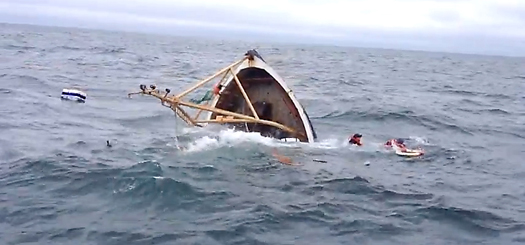
The two crew takes to the chilly water of the Irish Sea as the trawler goes down
The pair battle their way clear of the swirling danger zone before brave crew on the Tribute drag them to safety. Read more in the Irish Sun here.
The men were airlifted (see video below) to Daisy Hill Hospital in Newry after another fishing vessel, the Tribute, recovered them from the water and raised the alarm.
Conference Calls On UK Govt to 'Save Our Irish Sea'
#MARINE WILDLIFE - Marine experts are calling on the UK public to pile pressure on their government to create Marine Conservation Zones (MCZs) to help protect and restore marine wildlife in the Irish Sea and around the British coast.
The Living Seas North West Conference in Cumbria recently was a call to arms for marine experts and the public to join forces to protect the oceans.
And organisers the North West Wildlife Trusts used the event to press support for nature reserves in the Irish Sea as part of a UK-wide campaign by The Wildlife Trusts for 127 MCZs around the United Kingdom.
Callum Roberts, Professor of Marine Conservation at the University of York, described areas off the Isle of Man which have never been dredged as “carpeted with life”.
He said: “In the 19th century the Irish Sea bed was crusted with oysters. Today it is not just a sea different in the quantity of the wildlife it is different in the quality of the habitats in which that wildlife lives.”
Prof Roberts described how a study showed that dredging to catch 28,000 prawns also caught 12,000 other fish, most of which were thrown away. He also spoke of dives where he has seen the seabed damaged in huge areas by trawling.
“Over-fishing is not the only thing going on in the oceans," he said, "they are also affected by climate change and pollution. Our seas are changing faster than at any other time in human history.”
Prof Roberts said he was not against fishing, but that conservationists and the fishing industry need to find some common ground. “The prosperity of wildlife and the fishing industry depend on it," he said.
Meanwhile, The Wildlife Trusts marine protected areas manager Richard White spoke about the problems caused "by all the things that human activity is doing wrong".
He added: "We are trying to increase the resilience of our marine wildlife. The critical part is that we are doing this by trying to create Marine Conservation Zones.”
Pollution was highlighted by TV star and diver Paul Rose and Caroline Salthouse of the North West Coastal Forum.
“A huge problem is ocean debris," said Rose. "In 43 years of diving I am beginning to see more plastic and less fish. It is an issue that we must use to get people engaged in what is going on in our seas.”
Salthouse called for the public not only to sign the Wildlife Trusts’ new 'Petition Fish', but also to write to the British government as individuals.
More details about the Marine Conservation Zones and Petition Fish can be found at www.wildlifetrusts.org/living-seas
Irish Fishing Opportunities Next Year in the Atlantic and North Sea
#fishing – Irish fishermen may get additional fishing opportunities in 2013 according to am EU Commission proposal this afternoon.
The Commission has proposed increased levels of total allowable catch (TAC) for certain fish stocks in the Atlantic and the North Sea. In line with scientific advice, the Commission proposes to increase or maintain the TACs for 16 stocks (including certain stocks of herring, cod, whiting and sole), and reduce them for 47 stocks. Today's proposal sets levels of TAC for stocks managed exclusively by the EU.
The Commission's ultimate goal and one of the pillars of the on-going Common Fisheries Policy (CFP) reform is to have all stocks fished at sustainable levels, the so-called Maximum Sustainable Yield (MSY), by 2015. Whenever possible, scientists advise on how to bring the stocks to MSY levels. This year, the so-called "MSY advice" could be issued for 20 stocks (compared to 12 last year). This is a marked improvement as far as the availability and quality of scientific data are concerned.
Maria Damanaki, European Commissioner for Maritime Affairs and Fisheries, said: "we have to think long-term. European fishermen face a bleak future without sustainable, healthy stocks. Thanks to long-term management a number of stocks in the Atlantic waters are already fished at MSY levels. But at the same time 47% of stocks are still overfished. These facts support the Commission's vision for the CFP reform."
Details of the proposals
According to scientific advice, Norway lobster in the West of Scotland, plaice in the Eastern Channel, cod and sole in the Celtic Sea, and sole in the Western Channel are at MSY levels and the Commission proposes to raise or maintain their TACs.
At the same time, cod stocks in the Irish Sea and the Kattegat continue to be in a poor state, and the poor data hampers the management of these stocks. Sole in the Irish Sea is at extremely low levels and the Commission proposes to stop the direct fisheries and minimise the by-catches. MSY advice for haddock in the Celtic Sea and sole in the Bay of Biscay demands considerable TACs cuts, so that the stocks can be brought to MSY levels. Cod and whiting in the West of Scotland, subject to extremely high rates of discarding, continue to be in a very poor state and well below safe levels.
For more than 30 stocks where data is limited, the Commission has followed the direction recommended by the International Council for the Exploration of the Sea (ICES), and proposed cutting the TAC by 20%, in light of recent trends observed in these stocks, and on precautionary considerations.
Background
The present proposal concerns only the 83 stocks for which the TACs are decided by the EU alone. A second proposal will deal with the stocks for which the fishing opportunities are set in the context of Regional Fisheries Management Organisations (RFMOs) or consultations with third countries (shared stocks). It will be tabled later this autumn when some of the results of those international negotiations become available.
The proposed catch limits are based on the scientific advice from the International Council for the Exploration of the Sea (ICES) and the Scientific, Technical and Economic Committee for Fisheries (STECF). Stakeholders were also consulted, based on the Commission's Consultation document from June (IP/12/584).
Useful links
· TACs and quotas: http://ec.europa.eu/fisheries/cfp/fishing_rules/tacs/index_en.htm
· Scientific advice: http://ec.europa.eu/fisheries/cfp/fishing_rules/scientific_advice/index_en.htm
· Multiannual management plans: http://ec.europa.eu/fisheries/cfp/fishing_rules/multi_annual_plans/index_en.htm
· Map of fishing areas: http://ec.europa.eu/fisheries/documentation/publications/cfp_factsheets/fishing_areas_en.pdf
EU Fisheries Fund Allocation Deal Reached Today
Agreement on how a fisheries fund of approximately €6 billion will be allocated among EU Member States was reached in Luxembourg today following two days of negotiations at the EU Agriculture and Fisheries Council.
Minister for Agriculture, Food and the Marine, Mr. Simon Coveney T.D has been making the case to maximise Ireland's access to the fund which will provide significant funding to the seafood sector over the period 2014-2020, and enhance growth and jobs in this vital part of the economy.
In previous years Ireland's allocation from similar funds has been lower than warranted according to Minister Coveney who has been fighting to increase Ireland's share and deliver support to a sector which has the potential to create further jobs and assist in Ireland's economic recovery.
Not for the first time, the Fisheries Council worked through the night to come to a final compromise on the way in which funds will be spent to develop a competitive yet sustainable fishing industry. The fund, which will be used to support the new Common Fisheries Policy, (CFP) can be used for fleet modernisation, safety equipment, aquaculture development, adding value through processing, in addition to investment in new fishing gear to more effectively target stocks and assist in the reduction of discards.
Speaking early this morning, Minister Coveney stated that "The Irish seafood industry is a hugely important part of the economy, providing employment for more than 10,000 people. It is my job to drive a hard bargain on behalf of fishermen and their families but also to put a policy in place which will protect and build our fish stocks. Negotiating access to finance through the CFP is essential to that effort"
SFPA Facilitates Trade in Irish Fishery Products to China
#SFPA – The Sea-Fisheries Protection Authority (SFPA) held a bilateral meeting on seafood exports from Ireland to China today with key representatives from the General Administration of Quality Supervision, Inspection and Quarantine (AQSIQ), the organisation that carries out the import controls in China. The meeting took place at the SFPA's head office in the National Seafood Centre in Clonakilty, Co Cork.
In general terms, the meeting emphasised the assurances provided by official controls carried by the SFPA. Key topics discussed involved: risk assessments; health certification; certificate of origin, amongst others. A review of the Memorandum of Understanding then took place at the Department of Agriculture, Food and the Marine. Representatives from AQSIQ and the SFPA then proceeded to the National Seafood Centre at Bord Iascaigh Mhara (BIM) which was followed by visits to several seafood processing establishments.
Micheál O'Mahony, Board Member with the SFPA said: "This visit by AQSIQ allows the SFPA to continue to build on pre-existing linkages with relevant authorities in China responsible for checks and acceptance of Irish fishery products entering China. Our relationship with our Chinese colleagues is an important underlying basis to the continued market access for Irish seafood to China. International trade in food involves reciprocated trust in food control systems and we work hard to maximise the benefit of the high standards which Irish seafood companies adhere to. We are proud to attest to that compliance wherever possible to maximise benefit of such compliance to Irish operators. Our discussions today and in recent months with the AQSIQ build upon our developing relationship with these key stakeholders."
Public Consultation on Galway Bay Fish Farm Set to Begin
#GALWAY FISH FARM - Galway Bay FM reports that a full public consultation on proposals for what's set to be Europe's largest fish farm off the Aran Islands is scheduled to begin next week.
As previously reported on Afloat.ie, the 15,000-tonne deep-sea organic salmon farm would be located on a 500-hectare site in Galway Bay off Inis Oírr, and would be one of the largest of its kind in Europe, projected to be worth €103 million annually for the economy.
The statutory consultation period ended earlier this month after delays over the summer in publishing the licence application. And from next Monday 15 October, Bord Iascaigh Mhara (BIM) will make the plan and all statutory feedback available to the public via its website at www.bim.ie.
Advertisements announcing the consultation will appear in local and national newspapers, and packs will also be available to view for locals at Kilronan and Salthill Garda stations, including copies of the environmental impact statements and information on the statutory consultation process.
BIM aquaculture development manager Donal Maguire told Galway Bay FM that transparency is key to ensuring the public had all the information they need regarding the scheme - which has faced opposition from local anglers who fear the fish farm could have a negative impact on wild salmon numbers.


























